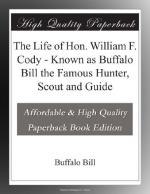Tutt replied that he would himself carry the watch across the street at nine o’clock, and no other man would do it.
Bill then said to Tutt that if he attempted anything of the kind, he would kill him.
A challenge to a duel had virtually been given and accepted, and everybody knew that the two men meant business. At nine o’clock the next morning, Tutt started to cross the street. Wild Bill, who was standing on the opposite side, told him to stop. At that moment Tutt, who was carrying his revolver in his hand, fired at Bill but missed him. Bill quickly pulled out his revolver and returned the fire, hitting Tutt squarely in the forehead and killing him instantly.
Quite a number of Tutt’s friends were standing in the vicinity, having assembled to witness the duel, and Bill, as soon as Tutt fell to the ground, turned to them and asked if any one of them wanted to take it up for Tutt; if so, he would accommodate any of them then and there. But none of them cared to stand in front of Wild Bill to be shot at by him.
Nothing of course was ever done to Bill for the killing of Tutt.
CHAPTER XI.
A SOLDIER.
In the fall of 1861 I made a trip to Fort Larned, Kansas, carrying military dispatches, and in the winter I accompanied George Long through the country, and assisted him in buying horses for the government.
The next spring, 1862, an expedition against the Indians was organized, consisting of a volunteer regiment, the Ninth Kansas, under Colonel Clark. This expedition, which I had joined in the capacity of guide and scout, proceeded to the Kiowa and Comanche country, on the Arkansas river, along which stream we scouted all summer between Fort Lyon and Fort Larned, on the old Santa Fe trail. We had several engagements with the Indians, but they were of no great importance.
In the winter of 1862, I became one of the “Red Legged Scouts,”—a company of scouts commanded by Captain Tuff. Among its members were some of the most noted Kansas Rangers, such as Red Clark, the St. Clair brothers, Jack Harvey, an old pony express-rider named Johnny Fry, and many other well known frontiersmen. Our field of operations was confined mostly to the Arkansas country and southwestern Missouri. We had many a lively skirmish with the bushwhackers and Younger brothers, and when we were not hunting them, we were generally employed in carrying dispatches between Forts Dodge, Gibson, Leavenworth, and other posts. Whenever we were in Leavenworth we had a very festive time. We usually attended all the balls in full force, and “ran things” to suit ourselves. Thus I passed the winter of 1862 and the spring of 1863.
Subsequently I engaged to conduct a small train to Denver for some merchants, and on reaching that place in September, I received a letter stating that my mother was not expected to live. I hastened home, and found her dangerously ill. She grew gradually worse, and at last, on the 22d of November, 1863, she died. Thus passed away a loving and affectionate mother and a noble, brave, good and loyal woman. That I loved her above all other persons, no one who has read these reminiscences can for a moment doubt.




